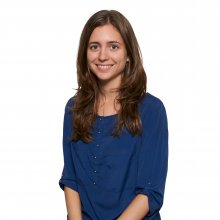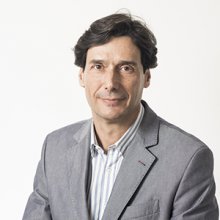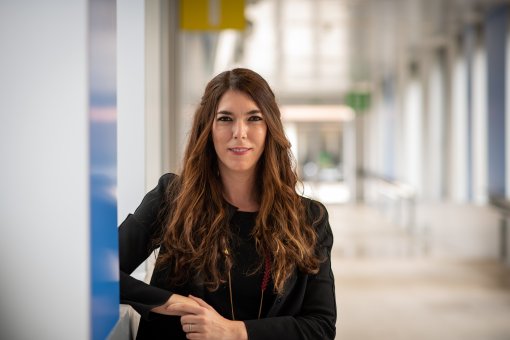Images
Participants


Contact

The “IRB Barcelona Futur” fellowship is funded by donations given to the permanent fundraising campaign “Futur”, which supports the training of young scientists.
The first awardee is a 24-year-old student who graduated in Biomedicine and holds a Master’s from the University of Utrecht and the Gurdon Institute in Cambridge Cambridge.
This month the Institute for Research in Biomedicine (IRB Barcelona) has welcomed 11 new PhD students into its ranks, among them special mention is given to Elena Meléndez Esteban. This 24-year-old from Barcelona is the first student to be awarded the “IRB Barcelona Futur” fellowship, which has come about through social altruism.
The new “Futur” fellowship is one of 11 included in IRB Barcelona’s International PhD Programme this year, but the only one that does not depend on public funding for PhD training as it is partially supported by donations given to the “Futur” fundraising campaign.
The fellowship, which brings with it 20,000 euros gross/year for the next four years, has been given to the student that was most highly ranked by this year’s candidate selection committee. Of note, all the applications received were considered outstanding. "I was so excited when I received the letter telling me all about the “Futur” fellowship," Elena Meléndez explains. "I had never heard of any initiative of this kind. So many people have shown such generosity in supporting the PhD training of a young researcher that they don’t know. They are examples of altruism to be followed,” she says.
IRB Barcelona launched “Futur” at the end of 2016 to highlight and ask for support for two of the cornerstones of the centre: increasing public awareness of the need for biomedical research and providing outstanding training for young scientists from all over the world. Since IRB Barcelona was founded 12 years ago, 320 young researchers have obtained their PhDs at the centre and this year 107 students (70 women and 34 men)—30% of them non-Spanish nationals—are working towards their doctorates.
“Behind medical breakthroughs is the effort of thousands of biomedical researchers… people who are trained to understand human biology and to make discoveries that will become the medicine of tomorrow. Training scientists will be to all our benefit,” says Joan J. Guinovart, director of IRB Barcelona.
Given the positive public response to the first edition of the “Futur” campaign, the centre has made it a permanent initiative through which to channel donations to support young researchers. "Futur" has raised more than 12,000 euros from hundreds of donors and the company sponsors Merck, Promega and Waters.
Elena: backing a future together
Elena Meléndez graduated in Biomedicine from the University of Barcelona in 2015 and has just finished a two-year Master’s in "Cancer, stem cells and developmental biology" at the University of Utrecht (Netherlands) and the Gurdon Institute in Cambridge (UK).
She will spend the next four years in Dr. Manuel Serrano’s Cell pasticity and Disease Lab, where she will be working on a PhD thesis addressing regenerative medicine and tissue repair. “My passion for biomedicine was sparked by my biology teacher. Her classes were amazing and I always wanted more,” recalls Elena, who studied at the “Dominiques de l’ Ensenyament” school in Mallorca Street in Barcelona. "I am an inquisitive, tenacious and enthusiastic person. I hope to learn a lot and get the most out of these coming years”.
The school supporting “Futur”
The state primary school "Vinya del Sastret" in Sant Esteve Sesrovires (Barcelona) has actively participated in the “Futur” campaign by making a donation which was raised through a series of fundraising activities. To thank all those involved, on Wednesday 25, researchers from IRB Barcelona, among them Elena Meléndez, visited the school to do experiments and give educational workshops. The aim of the activity was to bring kids closer to science and perhaps inspire future scientific vocation. It’s the first time the school has held its own “Science Day”.
About IRB Barcelona
Created in 2005 by the Generalitat de Catalunya (Government of Catalonia) and University of Barcelona, IRB Barcelona is a Severo Ochoa Centre of Excellence, a seal that was awarded in 2011. The institute is devoted to conducting research of excellence in biomedicine and to transferring results to clinical practice, thus improving people’s quality of life, while simultaneously promoting the training of outstanding researchers, technology transfer, and public communication of science. Its 25 laboratories and seven core facilities address basic questions in biology and are orientated to diseases such as cancer, metastasis, Alzheimer’s, diabetes, and rare conditions. IRB Barcelona is an international centre that hosts 400 employees and 32 nationalities. It is located in the Barcelona Science Park. IRB Barcelona forms part of the Barcelona Institute of Science and Technology (BIST) and the “Xarxa de Centres de Recerca de Catalunya” (CERCA).
About IRB Barcelona
The Institute for Research in Biomedicine (IRB Barcelona) pursues a society free of disease. To this end, it conducts multidisciplinary research of excellence to cure cancer and other diseases linked to ageing. It establishes technology transfer agreements with the pharmaceutical industry and major hospitals to bring research results closer to society, and organises a range of science outreach activities to engage the public in an open dialogue. IRB Barcelona is an international centre that hosts 400 researchers and more than 30 nationalities. Recognised as a Severo Ochoa Centre of Excellence since 2011, IRB Barcelona is a CERCA centre and member of the Barcelona Institute of Science and Technology (BIST).





